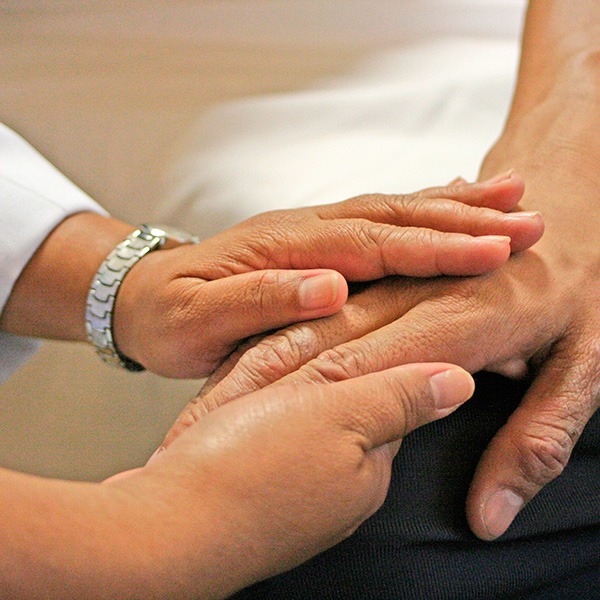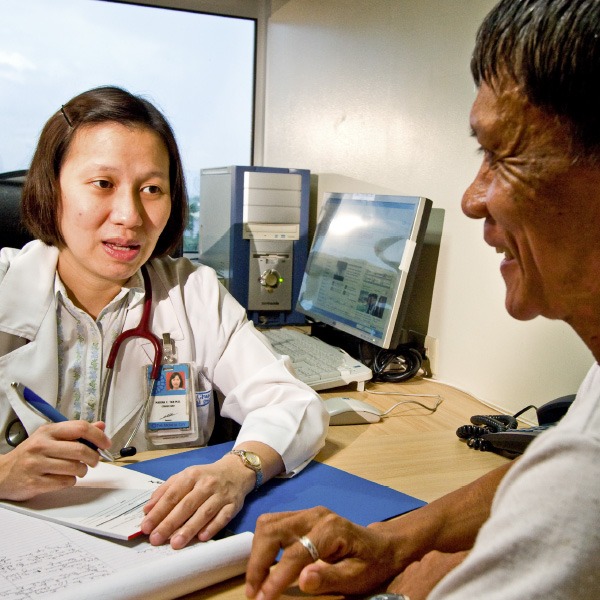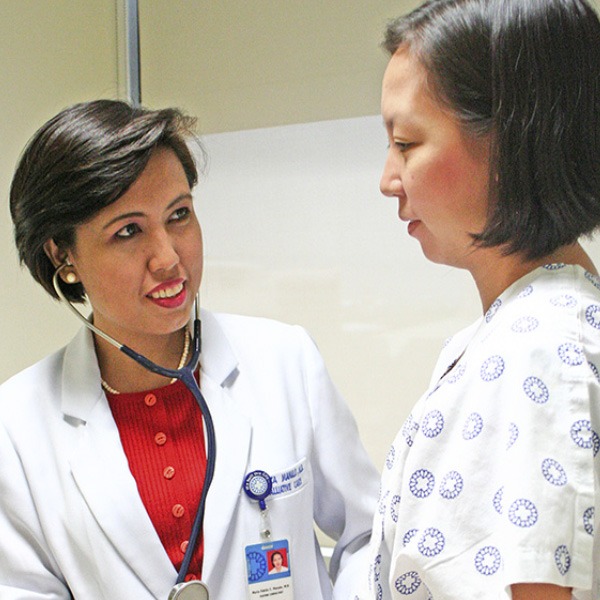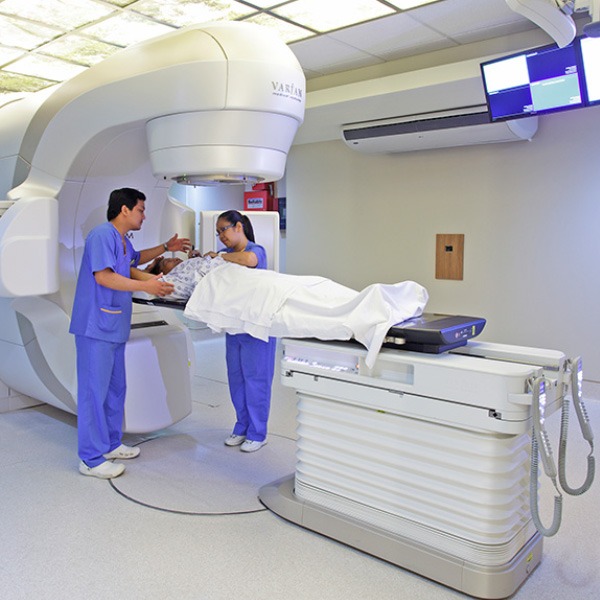Nurse Navigator Services / Cancer Care Coordinating Services
It is a service system that facilitates continuity of your care where all services you need are delivered overtime by service providers who established secure and dependable relationships and where appropriate care is available and flexible enough to meet your needs.

Multidisciplinary Family Meeting
A multidisciplinary team develops a personalized treatment plan according to the profile and preferences of the patient who is the focus of the cancer program. The team is made up of cancer specialists, nurses, and other specialized health care professionals. Family members are also an important part of the team. Another unique service offering of the Augusto P. Sarmiento Cancer Institute is the multidisciplinary meeting. During the multidisciplinary meetings with members of the care team, the patient and his family members are encouraged to ask questions, express reservations and get involved in making important decisions concerning the patient’s care plan.

Nutrition Management Services
Obesity increases the risk of many types of cancer. It also increases the risk of heart disease, stroke, diabetes, and other health outcomes, such as dying at an early age.
While it is not clear exactly how excess body fat, consuming too many calories, and lack of physical activity raise cancer risk, there is no question that they are linked to an increased risk of many types of cancer and that they are a serious and growing health problem.
Being overweight or obese is clearly linked with an increased risk of several types of cancer:
- Breast (among post menopausal women)
- Colon and rectum
- Endometrium (lining of the uterus)
- Esophagus
- Kidney
- Pancreas
Being overweight or obese also likely raises the risk of other cancers:
- Gallbladder
- Liver
- Non-Hodgkin lymphoma
- Multiple myeloma
- Cervix
- Ovary
- Aggressive forms of prostate cancer

Cancer Treatment down to the Molecular Level
At the Medical City, we only use adult stem cells which can be harvested from the bone marrow (bone marrow aspiration) or the peripheral blood. We can also use stem cells from the umbilical cord blood and materials. The Medical City has an Umbilical Cord Bank. In our laboratory, the cells are then isolated, cultured and expanded, engineered, and processed. The kind of cells that will be eventually used is dependent on the individual patient’s needs and disease processes.
Once the cells are completely prepared, they are either injected intradermally or through the skin (eg. In case of cancer vaccines), infused intravenously (through the veins) or locally injected (eg. Intraspinal injection or injected into joints. This is done in the hospital under careful monitoring. The duration of the treatment will depend again on the individual patient’s disease and response.
Stem cell therapy is not a one-size-fits-all therapy. Each person is different. The response of each person to the therapy is likewise different, even if they have similar diseases.
Pain Management Services
The Medical City Pain Management Clinic is a unique and comprehensive facility that provides extensive diagnostic and therapeutic pain-related services for both in- and out-patients of various ages all in one location. The multidisciplinary approach to pain management is an assurance of excellent and cost-effective management of acute and chronic pain syndromes, including cancer pain.
The Pain Management Clinic offers the following services and features:
- Dedicated Anesthesiologists/ Pain Management Specialists, and Pain Nurses
- Peripheral Nerve Blocks
- Trigger Point Injections
- Epidural Steroid Injections
- Facet Joint Injections
- Intravenous/ Epidural Patient-Controlled Analgesia for inpatients
- Inpatient Evaluations/Referrals
- Outpatient Consultations

Palliative Care
Palliative care is a special kind of patient and family centered health care that focuses on effective management of pain and other distressing symptoms that cause strain, anxiety and suffering for the patient, while incorporating psychosocial and spiritual care according to patient/family needs, values, beliefs, and cultures.
The goal of palliative care is to anticipate, prevent, and reduce suffering and to support the best possible quality of life for patients and their families, regardless of the stage of the disease or the need for other therapies. Palliative care begins at diagnosis and should be delivered concurrently with disease-directed, life-prolonging therapies and should facilitate patient autonomy, access to information, and choice. Palliative care becomes the main focus of care when disease-directed, life-prolonging therapies are no longer effective, appropriate, or desired. Palliative care should be initiated by the primary cancer team and then augmented by collaboration with a multi-disciplinary team of palliative care experts. (National Comprehensive Cancer Network, NCCN, Clinical Practice Guidelines in Oncology).
Pathology
The Medical City Department of Laboratories operates under the discipline of laboratory medicine and provides relevant information for the diagnosis, prevention or treatment of disease, impairment of personal care, and assessment of health.
The Laboratory processes over two million laboratory procedures annually. It has extensive testing capabilities in the following areas: Chemistry, Hematology, Blood Bank and Transfusion Services, Clinical Microscopy, Histology/Cytology, Microbiology, Serology, Immunology/Special Chemistry and Molecular Biology. The Laboratory can also provide a vast majority of routine tests, as well as a variety of special procedures. Ninety-nine percent of all testing is performed in-house. A home phlebotomy service is available for ambulatory and non-ambulatory patients.

Radiation Oncology
The Medical City’s Radiation Oncology Department offers radiation therapy services for the treatment of diseases primarily malignant tumors with the intent of improving the quality of life of patients. The Department also provides quality treatment by utilizing available modern technology and, complemented by its qualified and competent medical and allied medical staff. Through this, patients are assured of getting The Medical City’s brand of quality patient care and safety.
- External Beam Radiation Therapy: Using two Linear Accelerators (LINAC)
- Varian Truebeam Linear Accelerator (with Image Guided Capability)
- Varian Clinac 21EX Linear Accelerator
- Types of External Beam Radiation Therapy Procedures:
- Conventional Radiation Therapy
- Three-Dimensional Conformal Radiation Therapy (3DCRT)
- Intensity Modulated Radiation Therapy (IMRT)
- Image Guided Radiation Therapy (IGRT)
- Stereotactic Radio Surgery (SRS) / Stereotactic Body Radiation Therapy
- Computerized Treatment Planning 3D image based planning using CT-Scan and Magnetic Resonance Imaging (MRI)
- High Dose Rate Brachytherapy

Cancer Support Group
The Medical City’s Cancer Support Group meets every first Saturday of the month. They hold several activities like the Wellness in Illness Program. This is a semi-structured intervention to help facilitate emotional expression and processing for patients with chronic and debilitating illnesses and their families.
Primary modality:
- Eat – nutrition for health
- Pray – spirituality and prayer
- Live – self-expression through art, music, dance, creative writing
Objectives are:
- To provide a venue for emotional expression, primarily for patients and their families/caregivers
- To facilitate coping with symptoms of illnesses and their treatments